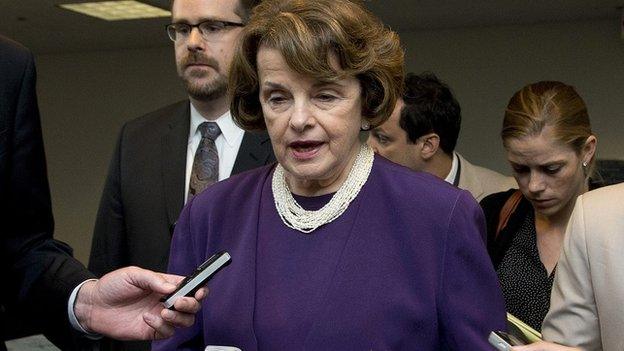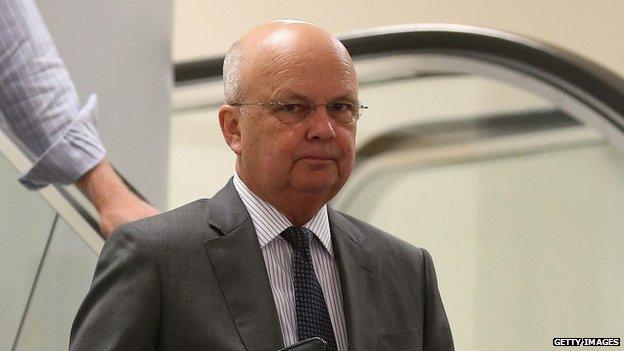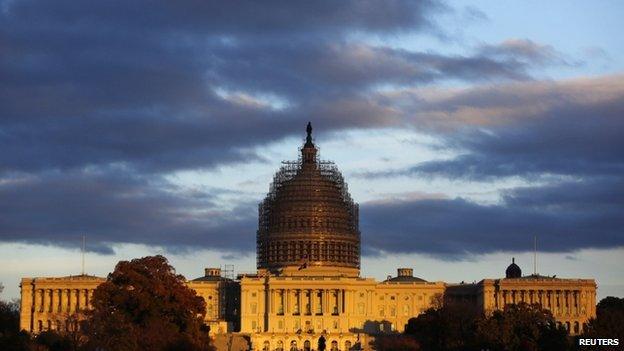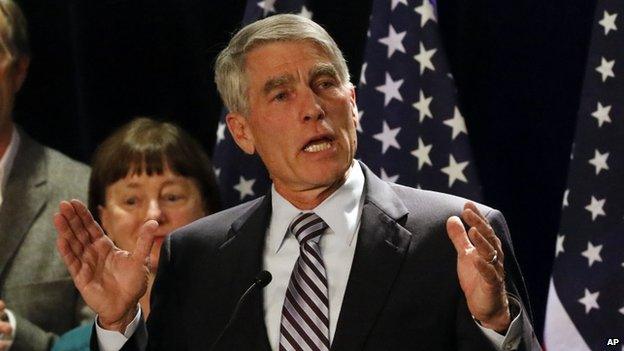CIA interrogation report: Battle lines being drawn
- Published
- comments

Senator Diane Feinstein says the US torture report will be released this week
The public has yet to see the Senate Intelligence committee report on the rendition, detention and interrogation practices of the George W Bush administration, so its actual contents are currently the province of rumours and leaks.
With the release of its 480-page executive summary said to come on Tuesday, however, the arguments over its implications are already in full swing.
In an article, external in Monday's New York Times, Peter Baker says that the two-year-old report details the "brutal techniques" - considered torture by critics - the government employed on suspected al-Qaeda and other Islamic militants, and questions their effectiveness. It also reportedly contends that Central Intelligence Agency field operatives misled Congress and Bush Administration senior officials as to the extent of the programme.
The sharpness of the criticism, Baker says, has Bush Administration officials who devised and implemented the policies banding together to justify their actions.
The report, former CIA Deputy Head John E McLaughlin tells the Times, "uses information selectively, often distorts to make its points, and as I recall contains no recommendations".

Former CIA Director Michael V Hayden tells the New York Times that "we're here to defend history", not torture
"We're not here to defend torture," former CIA Director Michael Hayden says. "We're here to defend history."
On Saturday the Washington Post, external published an opinion piece by Jose A Rodriguez Jr, the CIA operative in charge of the interrogation programme. He says the policies were "authorised by the highest levels of the US government, judged legal by the Justice Department and proved effective by any reasonable standard".
Not only that, he adds, some of today's biggest critics were once the loudest voices calling for the CIA to "do everything possible to prevent another attack on our soil".
He says in the days after the 9/11 attacks, Senate Foreign Relations Committee Chair Dianne Feinstein - who has become a driving force in recent efforts to release the report - and other Democratic senators were privately urging the CIA to take charge.
"Our reward, a decade later, is to hear some of these same politicians expressing outrage for what was done and, even worse, mischaracterising the actions taken and understating the successes achieved," he writes.
The report's critics also contend that its release could provide a propaganda win for US enemies and threaten US allies - said to be part of the reason why US Secretary of State John Kerry asked Ms Feinstein on Friday to delay the report's release.
"This will be used by our enemies to motivate people to attack Americans and American facilities overseas," Mr Hayden said in a CBS interview, external on Sunday.
Appearing on Fox News, external, House Intelligence Committee Chair Mike Rodgers said: "Our foreign partners are telling us this will cause violence and deaths."

Republican members of the Senate Foreign Relations Committee plan to release a separate report of their own
Such arguments are bunk, writes Tufts University Prof Daniel W Drezner for the Washington Post, external.
"There is no shortage of US foreign policy actions and inactions in the region to inflame enemies," he writes. "The Senate report is small potatoes compared to that."
Blogger Andrew Sullivan, external disagrees, but says he wants the report released anyway.
"Of course this complicates relationships with foreign countries; of course it guts any remaining credibility on human rights the US has; of course the staggering brutality endorsed by the highest echelons in American government will inflame American enemies and provoke disbelief across the civilised world," he writes.
"But that's not the fault of the report; it's the fault of the torture regime and its architects, many of whom have continued to operate with total impunity under President Obama."
Democratic Senator Mark Udall, who has read the report and is an outspoken advocate for its release, says people will be "disgusted" by its contents.
"When this report is declassified, people will abhor what they read," Mr Udall told Esquire, external magazine. He says that if its release is blocked, he will "use every power" to get it into the public record, perhaps even reading it on the Senate floor.

Senator Mark Udall claims people will be "disgusted" by the report's findings
"It's too historic," he says. "And we can't afford to repeat the mistakes to let this slide."
Once the report is out, expect the argument to only grow fiercer. According to the Times, the document's authors will respond to critics once Americans have had an opportunity to review the facts "and make up their own minds".
The Daily Beast, external's Shane Harris and Tim Mak write that a group of former government officials have already penned on opinion piece for the Wall Street Journal, to be published after the report is released, that will present a "fierce rebuttal of the committee's findings" and "blast what they see as a biased, five-year process that culminated in a flawed history" of the programme.
In addition, Republican members of the Senate Foreign Relations Committee, who did not sign off on the report, plan to release one of their own.
History is written by the victors, as the saying goes. It explains why former administration officials and their critics see the upcoming battle over the Senate report - a perhaps not-so-small piece of history in the US "war on terror" - as too important to lose.